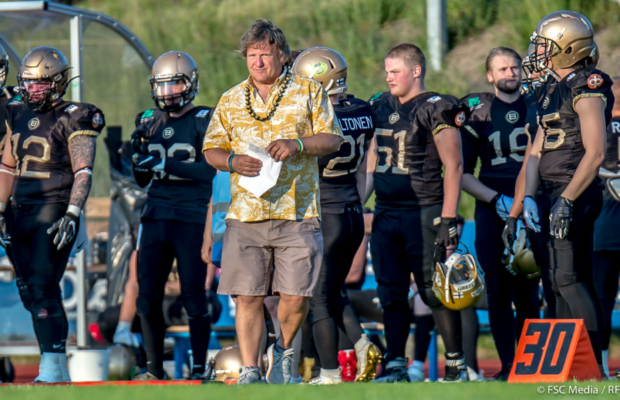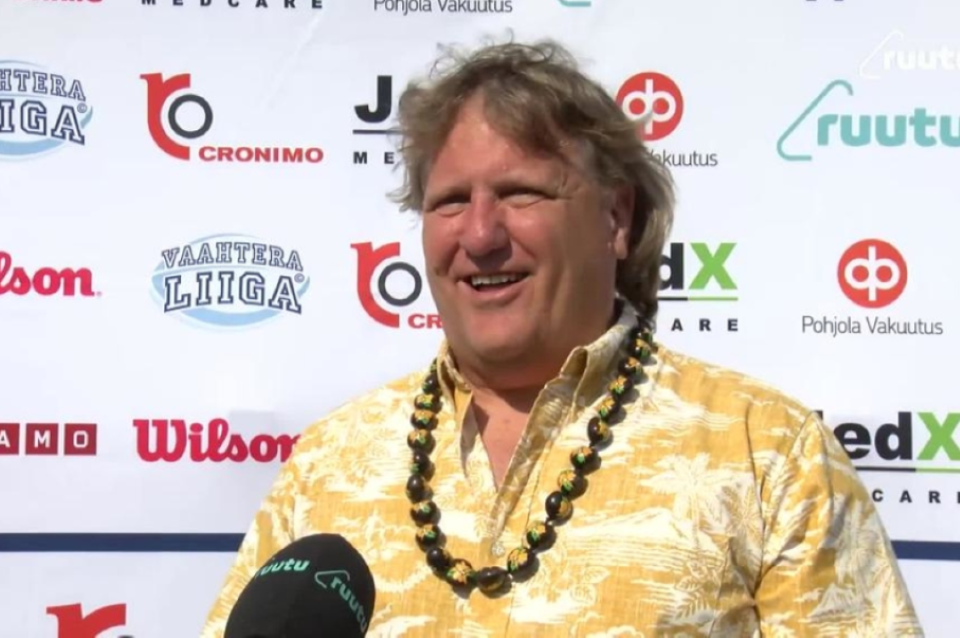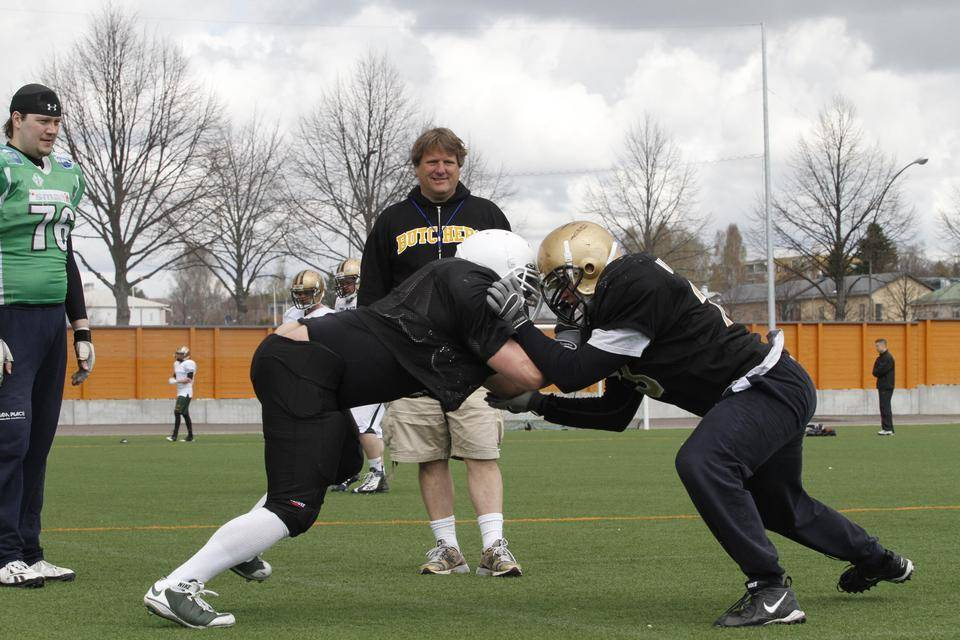Porvoo Butchers HC Jim Nendel’s Aloha approach goes beyond a shirt

Standing on the sideline for the Porvoo Butchers head coach Jim Nendel is impossible to miss.
While most coaches opt for a muted team-branded polo or well-worn hoodie, the native of Spokane, Washington shines like beacon in his bright Aloha shirt. In many ways, the shirt defines Nendel’s coaching style and permeates the way he lives his life, but not in the way one might initially believe. What some may interpret a flashiness is actually a physical symbol of a life philosophy that is quite the opposite.
“Everybody thinks aloha is just hello and goodbye, but the essence of it is with compassionate love,” Nendel explains. “So when I say hello to you, it’s with compassion and love and it’s to serve your people.”
That’s a cultural viewpoint that Nendel was first exposed to during his decade as an assistant coach at his alma mater Whitworth College, when his recruiting area was the state of Hawaii, but it has gone beyond simply an appreciation of the culture. As a PHD student at Penn State, Nendel wrote his thesis on Duke Kahanamoku, the five-time Olympic medalist Hawaiian swimmer who popularized the sport of surfing and spawned Nendel’s particular style of Aloha shirt.
“He could have commercialized himself and made a lot of money, but he never did because he felt like what he was doing was to further and to promote his people. It was the servant leadership approach before that term became popular,” Nendel says of his Hawaiian idol.
“For me, when I wear that, I wear it in honor of Duke and to remind myself that I need to be a servant leader, that I need to have compassionate love.”
Nendel needed special permission to wear the shirt, which didn’t adhere to the Maple League’s dress code, on the sideline, but the results of Duke’s servant leadership approach are already speaking for themselves. After taking over a Butchers team that was winless the last two seasons, Nendel’s group has opened 2021 with back-to-back victories, first in a hard-fought opener over the 2020 Maple Bowl runner up Helsinki Wolverines and then in a come-from-behind overtime thriller against the UNC Crusaders.
The success has been a breath of fresh air for the Porvoo program after some lean years, but it wasn’t initially supposed to be Nendel at the helm this season. The club originally hired Gordon McGruder to guide the team but when that fell through, turned to a familiar name in Nendel, the head coach when they last claimed a Maple League title in 2010.
Having taken a break from coaching to address burn out and treat emerging memory issues from his playing days, Nendel saw the surprise phone call as a perfect opportunity to return to his passion in a place close to his heart.
“It just felt like the right time to get back into it. I love the city and a lot of the guys that are helping coach our juniors and our men’s team now are guys that I coached when we won the Maple League,” he explains.
“There’s a few players still playing and we have a few guys that came back out of retirement this year to come play. That’s been fun just to have friends here, to see the development of a city and what these guys have done is pretty impressive.”
Nendel first entered the ranks of European coaches more than three decades ago quite by accident. After losing his spot on the New England Patriots practice squad, he hoped game tape would give him a way back to the pros and signed with the UK’s Manchester All-Stars in 1986. His flight was the first of the American imports to arrive and he was informed on the car ride from London that made him the head coach by default.
Nendel spent five years as a player coach in the wild west of English football, learning a style of coaching built on trust with his fellow players that he maintains to this day. He returned to his native Washington state, coaching college, high school and semi-pro ball and wouldn’t coach across the Atlantic again for almost 20 years. In 2010, he took over the dynastic Butchers, winning the Maple Bowl in 2010 before falling short in 2011. It was an era in which Porvoo was the dominant Finnish program and the coach knows exactly what he credits for it.
“People ask me what’s the difference? The Finnish leadership. There wasn’t one guy who was running things and there was some football players, but all the Finnish guys were confident and they were all leaders. They didn’t let things go and let people just do whatever they wanted to do,” Nendel recalls.
“There was a sense that they were in charge and the American imports that came in, you were playing for them. This is your job, but don’t tell us what to do. You help us with stuff, but we understand this game.”
Nendel departed Finland after the 2011 season, serving as defensive coordinator for the Basel Gladiators of Switzerland. After that, it was back to Spokane, where he launched the football program at Northwest Christian School. In just a few years, he transformed a team with 80% new players into a state title contender, while also being named Washington’s academic state champion as the team with the highest GPA four times.
“I really believe in balance and character development. If all we’re here to do is win football games, then we’re not doing what we’re supposed to do,” Nendel says of the coaching philosophy born in Europe that he instilled in the program.
“We’ll mention winning, but winning isn’t the only goal because you can’t control what happens in a game. The only things you can control are your attitude, your effort, your togetherness, and your perseverance.”
Having returned to Porvoo, he’s placing a similar emphasis. While the first thing required upon arrival was to simplify the team’s schemes to a manageable level, getting a team where many players hadn’t experienced winning to buy in was far more important.
“We had to reinstate this idea that it’s an honor to be a Butcher. It has a long history, but it’s not just about winning games and being a dynasty,” Nendel stresses. “It’s letting guys understand that the reason those guys won was because they were always together. They were brothers.”
That matters in a small community like Porvoo and Nendel is enjoying seeing his team’s new-found belief in each other after two important wins.
“I would say that in some ways winning two close games has really impressed me. The team really stuck together and did not panic. They kept their composure and trusted one another,” Nendel says.
“It was evidence that they are believing in each other as we have talked about and it’s a huge step in achieving success, because they aren’t just talking about love but actively living it, which is a whole different level. They realize that this is a long journey to be made together and relish the challenge.”
The coach readily admits his team is not there yet, much work remains to go before the Butchers have returned to their former glory, but right now anything is possible. A team built on a compassionate love for each other, their community and the game is a powerful thing and they need only to look to their coach on the sideline if they need a visual reminder.

